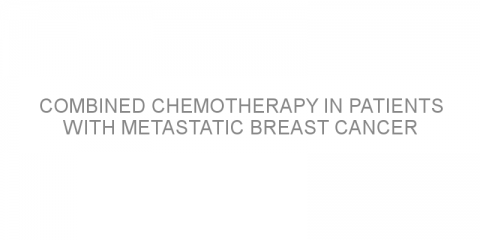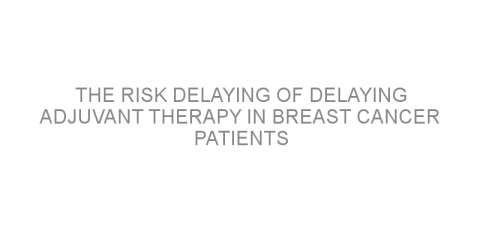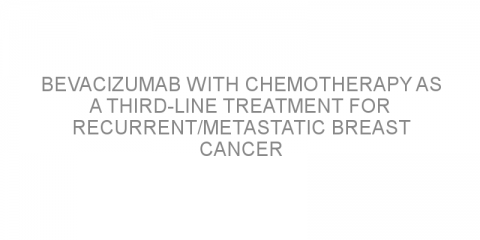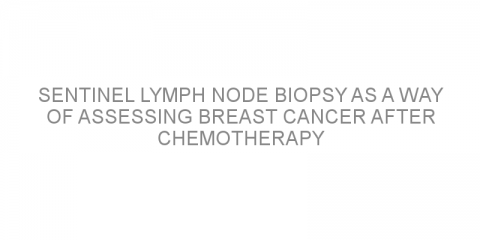In a nutshell This review examined the benefits of extending hormone therapy from 5 to 10 years in patients with hormone receptor positive breast cancer. The study concluded that treatment recommendations should take factors such as previous treatments and potential side effects into account. Some background Hormone-receptor (HR)-positive breast...
Read MoreBreast cancer Posts on Medivizor
Breast-conserving therapy versus mastectomy in N2 stage breast cancer
In a nutshell This study compared long-term survival following breast conserving surgery or mastectomy in patients with T1-2N2 breast cancer. The authors concluded that breast conserving surgery plus radiation was as effective as mastectomy and radiation in these patients. Some background Breast cancer is staged depending on the severity and...
Read MoreGuest Post: Cancer On Facebook–A Patient’s Perspective
Dawn Goo is a waitress, former comedian, breast cancer survivor and is now under treatment for Non Hodgkins Lymphoma. She lives in El Paso, Texas. This is a post from her Facebook page which is gathering momentum in social media among people who have experienced cancer, especially those who are dealing with Stage 4 disease. DAMN IT DAWN! WE ONLY WANT...
Read MoreCombined chemotherapy in patients with metastatic breast cancer
In a nutshell This study examined the effects of a combination of two treatments, low-dose capecitabine (Xeloda) and docetaxel (Taxotere), versus docetaxel alone in patients with metastatic, HER2-negative breast cancer. The study concluded that combination treatment improved time to disease progression. Some background...
Read MoreThe risk delaying of delaying adjuvant therapy in breast cancer patients
In a nutshell This study examined the relationship between the time taken to start adjuvant chemotherapy and survival. The authors determined that a delay in adjuvant chemotherapy was associated with reduced survival. Some background Adjuvant chemotherapy is additional chemotherapy given after surgery. It is routinely used in women who are at risk...
Read MoreAnalysis of lymph node ratios predicts outcomes in breast cancer patients
In a nutshell This study examined whether the lymph node ratio could predict outcome in breast cancer patients treated with neoadjuvant chemotherapy. This study concluded that the lymph node ratio could predict prognosis. Some background Lymph node involvement (cancer that has spread to the lymph nodes) affects prognosis (outcome) in...
Read MoreBevacizumab with chemotherapy as a third-line treatment for recurrent/metastatic breast cancer
In a nutshell This study investigated the long-term effectiveness bevacizumab (Avastin) with chemotherapy for HER2-negative locally recurrent/metastatic breast cancer. This study concluded that while bevacizumab combined with chemotherapy significantly improved time to disease progression compared with chemotherapy alone in the first two phases...
Read MoreSentinel lymph node biopsy as a way of assessing breast cancer after chemotherapy
In a nutshell This study investigated sentinel lymph node biopsy (SLNB) as a procedure to determine the staging of breast cancer in patients who had received neoadjuvant chemotherapy (chemotherapy given before surgery). The authors concluded that SLNB was suitable for staging of the cancer in patients with breast cancer that had not spread to the...
Read MoreThe impact of family history in patients with in situ breast cancer
In a nutshell This study examined the influence of family history on the risk of developing invasive breast cancer in women with in situ breast cancer. The authors determined that family history increased the risk of developing invasive breast cancer in these women. Some background In situ breast cancer is breast cancer that does not spread into...
Read MorePegylated liposomal doxorubicin and capecitabine are effective first line therapies for metastatic breast cancer
In a nutshell This study investigated the safety and effectiveness of using liposomal pegylated doxorubicin (PLD, Doxil) versus capecitabine (Xeloda) as initial treatment for metastatic breast cancer. The authors concluded that both treatments were safe and effective. Some background Metastatic breast cancer is a cancer that has spread to...
Read MoreLifestyle factors affecting chemotherapy-induced peripheral neuropathy
In a nutshell This study investigated the effects of specific lifestyle factors in the incidence and severity of chemotherapy-induced peripheral neuropathy (CIPN) in breast cancer patients. This study found that obesity, antioxidant supplements and physical activity were associated with CIPN. Some background CIPN, or damage to the...
Read MoreTreatment options for ductal carcinoma in situ and the risk of invasive breast cancer
In a nutshell The authors aimed to determine the effect of different treatments on the risk of developing invasive breast cancer (IBC) in women diagnosed with ductal carcinoma in situ (DCIS). The authors concluded that there was an interaction between age and follow-up period on IBC risk and that the benefit of radiation seemed to be smaller among...
Read More













